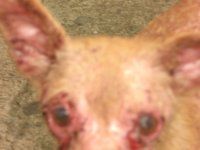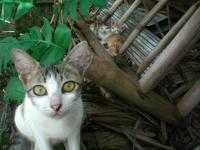Work On The Wild Side: North Luangwa National Park, Zambia
Sponsored Links
Although this article was originally published in January, 1997, the need for awareness about threats to wildlife remains the same.
Reprinted with permission from Frankfurt Zoological Society — Help for Threatened Wildlife.
Program for the development and conservation in North Luangwa National Park, Zambia.
Nature conservation usually requires an enormous amount of idealism, stamina and devotion for the chosen project. This applies for any kind of work for nature conservation anywhere around the globe, and it is especially true for conservation areas in African countries, where interest in the protection of natural habitats collides with the need of the local people to provide some basic means of subsistence.
The American zoologists Mark and Delia Owens had been working for Frankfurt Zoological Society (FZS) in the Kalahari desert for 7 years are well known throughout the world for their fascinating reports about their life and work in the wild. Their special story of dedication to nature conservation may be cherished in two most readable books (The Eye of The Elephant and Cry of The Kalahari).
When they took up working for the FZS in North Luangwa National Park in 1986 they had to start from scratch. Zambia had once been a wealthy country. But in preceding years the Zambian economy had been struggling through extreme difficulties, the rural population getting poorer and poorer.
It goes without saying that the financial means for the maintenance of conservation areas and national parks could not be provided. Thus, North Luangwa National Park only existed on paper, the administration having given it up. The infrastructure had broken down long ago, the few rangers who were still around had no equipment whatsoever. They had to live outside the park and every so often they had to work without pay. The people around the park mostly lived on poaching. Out of bare necessity the rangers often were involved in helping the poachers rather than protecting wildlife.
When Mark and Delia started, the rhinos had vanished and the elephants were diminishing by an average of 1000 per year. Establishing a basic infrastructure was their first issue. An airstrip had to be cut into the bush. More rangers had to be employed and supplied with radio equipment. Regular patrols of the park had to be established. After a difficult phase of tedious work in the beginning, the first successes became visible. The four–figure number of killed elephants per year dropped to 12 in 1991 and to one in 1993.
Additional sources of revenue for the park had to be found. Tourism may be one, once the infrastructure improves. More passable tracks have to be built. Suitable campsites have to be found. Plans for a solid lodge will still have to be postponed. Getting poaching under control was the most important asset for making the park safe enough for tourists to visit.
More has to be done to win the support of the people living nearby. Other sources of food and income have to be found for them to renounce poaching. Nature conservation clubs reaching about 10,000 youngsters were founded in more than twenty villages. Delia and Mark tour these villages with film presentations and slide shows which are of course very popular in these remote areas. These shows offer an excellent opportunity for promoting the idea of conservation and to raise trust between the National Park Administration and the local people.
Regular talks with the village elders are just as important as direct technical assistance for setting up chicken and fish farms. As poached meat used to be exchanged for grinding millet the project also provides millet mills. Shops where the necessities of life could not be bought simply did not exist, so the villagers had to cover long distances on foot in order to get their supplies. Small shops were established in the villages and today, the transport of goods is managed by the project. These activities, amongst others, helped the Owens win the confidence of the rural population and created some understanding for the National Park.
A lot still has to be done to find a satisfactory basis for work. Yet the project took off with a good start and shows first signs of success.
Meanwhile, Mark and Delia Owens have founded the Foundation for Wildlife Conservation
in the United States. With the help of donations collected by the Foundation, they were able to further increase their support for this very costly long range project.
The Eye of The Elephant
The Eye of The Elephant
is an excellent book by Mark and Delia Owens. After reading their book, I got permission from the Frankfurt Zoological Society to republish some articles about wildlife in Africa.
- The Vigilante Guardian
- Karen's Cats — All 176 of Them
- Good Energy!
- Fleas: Friend or Foe?
- Aloe Vera and All of Its Benefits
- Top 10 List
- Winnie The Pooh's Lost Story
- Prevent Bankruptcy: Make Deposits
- Trophotherapy — Food Cure
- Choices
- Raiders of The Lost Buried Bones!
- Homeopathy: A Natural Treatment
- Oil of Tamanu: Tahitian Remedy
- Consciousness of Dogs
- Health and The Air We Breathe
- Work On The Wild Side
- The African Wild Dog
- Are Antibiotics Making Your Pet Sick?
African Wild Dog
Elephants are not the only threatened animals in Africa. So is the African Wild Dog!
- The Vigilante Guardian
- Karen's Cats — All 176 of Them
- Good Energy!
- Fleas: Friend or Foe?
- Aloe Vera and All of Its Benefits
- Top 10 List
- Winnie The Pooh's Lost Story
- Prevent Bankruptcy: Make Deposits
- Trophotherapy — Food Cure
- Choices
- Raiders of The Lost Buried Bones!
- Homeopathy: A Natural Treatment
- Oil of Tamanu: Tahitian Remedy
- Consciousness of Dogs
- Health and The Air We Breathe
- Work On The Wild Side
- The African Wild Dog
- Are Antibiotics Making Your Pet Sick?
 Meet Jumbo, the participant in
Meet Jumbo, the participant in 